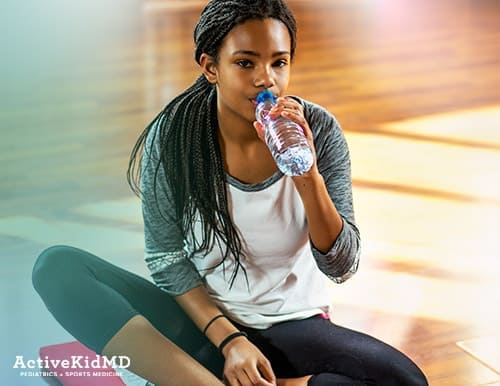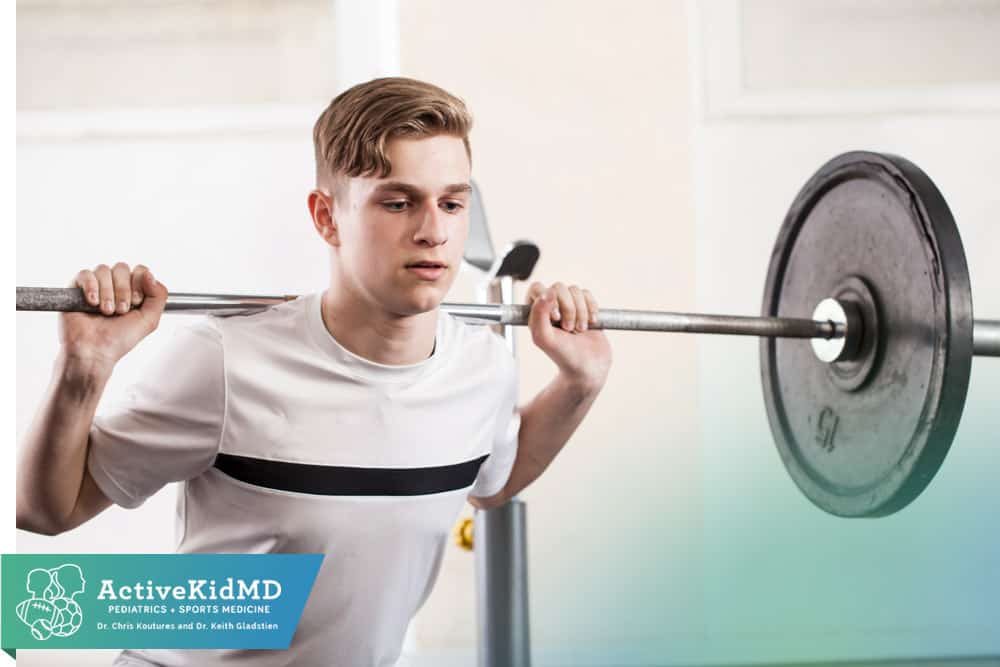Want to get the most out of your next workout?
Plan to arrive well-rested, well-hydrated, and energized, with time for a dynamic warm-up.
Read on to learn how to build a practical plan for the best pre-workout for teenage athletes to help maximize performance and results.
Show up well rested
Coming into a workout sleep-deprived is a tough way to start. Muscles need recovery time for repair and growth, and the nervous system also works better when given appropriate downtime to recharge.
So, exactly how much sleep do you need? At least eight (8) hours is the magic number.
How important is this 8+ hours of sleep?
Sleep is so important that all the time spent planning for best fluids/nutrition (read on) and best workout programs will be wasted in a sleep-deprived athlete.
Many teams schedule early morning workouts (zero period, does that sound familiar?). Word to the wise: if athletes aren’t getting enough sleep, they won’t get the best pre-workout preparation for those pre-school sessions.
VIDEO ON IMPROVING THE AMOUNT AND QUALITY OF YOUR SLEEP
Show up well-hydrated
Having frequent workouts without appropriate fluid intake can lead to poor performance. Some athletes may lose several pounds during exercise in hot and humid conditions (both indoor and outdoor – remember, some gyms or studios don’t have the best air movement). You can also lose some fluid while sleeping. So, if you are increasing sleep time to get those important 8+ hours, it is important to also increase appropriate fluid intake upon awakening.
Dehydration can affect the quality of exercise, the ability to maintain body temperature, and lead to early fatigue and cramping. Watch body weight, especially in hot or humid environments and with multiple exercise sessions with short recovery periods. Check your weight before and after sleep as well as before and after exercise. A weight loss of more than 2% from regular weight suggests dehydration. This requires adequate fluid intake (usually with water) to correct the reduction in body weight.
What is the best pre-workout drink?
Water is preferred over flavored sports beverages. Water provides an inexpensive, readily accessible and low-calorie option. Cold water is better absorbed. For those who choose not to drink water and want something with taste, flavored sports beverages are a sensible option. The American Academy of Pediatrics counsels against routine consumption of flavored sports beverages outside of sport activity. This is due to concerns that excessive sugar intake can impact both dental health and body weight.

- Drink 16-20 ounces of fluid at least four hours before exercise.
- Drink 8-12 ounces of water 10-15 minutes before exercise.
RELATED CONTENT: Best Sports Drink: What is the Best Choice?
Show up energized
Take time to maximize your physical and emotional energy as part of your pre-workout routine.
Set a few goals for each workout such as improving a skill, increasing reps, or achieving something new. This will add challenges to the routine of regular training. Take in some mindfulness before the workout – some deep breathing or visualization of what you want to accomplish. Try to enter a workout with focused excitement and not on edge, anxious or rushed.
Add to your physical energy with a blend of shorter and longer-acting energy sources as an ideal pre-workout meal. Good examples include bagels (short-acting carbohydrate) and peanut butter (long acting protein), fruit (great for fluids and short acting energy), and hard-boiled eggs (longer protein).
Now, if you have a hard time eating right before exercise due to stomach discomfort and fears of throwing up, then take a tip from my fighter pilot colleagues and try bananas as a pre-workout meal. Why bananas? Pretty easy on stomach, have good carbohydrate and potassium, and if that vomit thing happens, they taste the same coming up as they do going down…
Try to get the pre-workout fuel in the system at least 30 if not more minutes ahead of exercise.
Do you need a pre-workout energy drink? Advertised pre-workout supplements or “energy drinks” are reported to enhance athletic performance; however, they routinely contain multiple components, the most common being caffeine, guarana, taurine and a lot of sugar. Yes, you will feel stimulated with greater endurance, but teenagers are especially at risk for some big-time side effects. These very real risks include fast heart rate, vomiting, dizziness, and potential muscle damage.
Always read labels of anything you eat or drink. Adding pre-workout supplements or energy drinks to usual caffeinated beverages of choice (coffee, iced tea) might give an enormous caffeine/stimulant load. Even without mixing in other caffeine sources, the possible dangers of these drinks can definitely outweigh possible benefits.
RELATED VIDEOS: GENERAL ATHLETE HEALTH- NUTRITION
VITAMINS AND SUPPLEMENTS
Now is the time for that dynamic pre-workout warm-up
You’ve got the sleep, fluids, and energy things all dialed in. Do you think it is time to jump right into a demanding workout?
Not quite.
Muscles that get a good warm-up are more flexible, more able to gain strength and size, and more able to recover quicker for the next workout.
What is a good warm-up routine?
A dynamic warm-up involves moving around, using multiple body parts (arms/legs) while increasing heart and breathing rates and breaking a light sweat. Good full body dynamic warm-up exercise examples include jogging combined with jumping jacks, bear crawls, and mountain climbers.
How about stretching as part of pre-workout? Current thought favors stretching after a dynamic warm-up or even after the workout itself. Stretching when warm is less likely to cause tears or create other damage to muscles, tendons or attachments to bones.
Keeping healthy before, during, and after activity is key! This means making sure teenagers are well rested, hydrated, energized and properly warmed up as part of the pre-workout plan.
ActiveKidMD’s goal is to help teenage athletes reach full potential in sports, school and life. Please contact us for more information on how we can be a partner in the health of you or your child.


